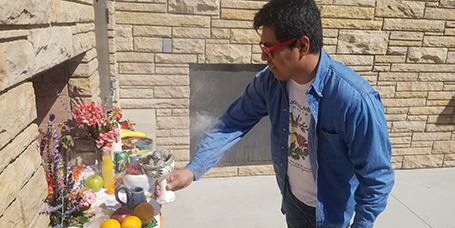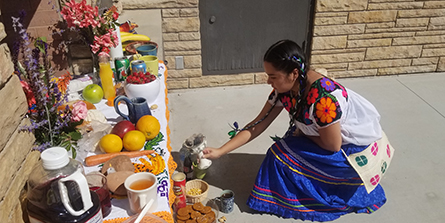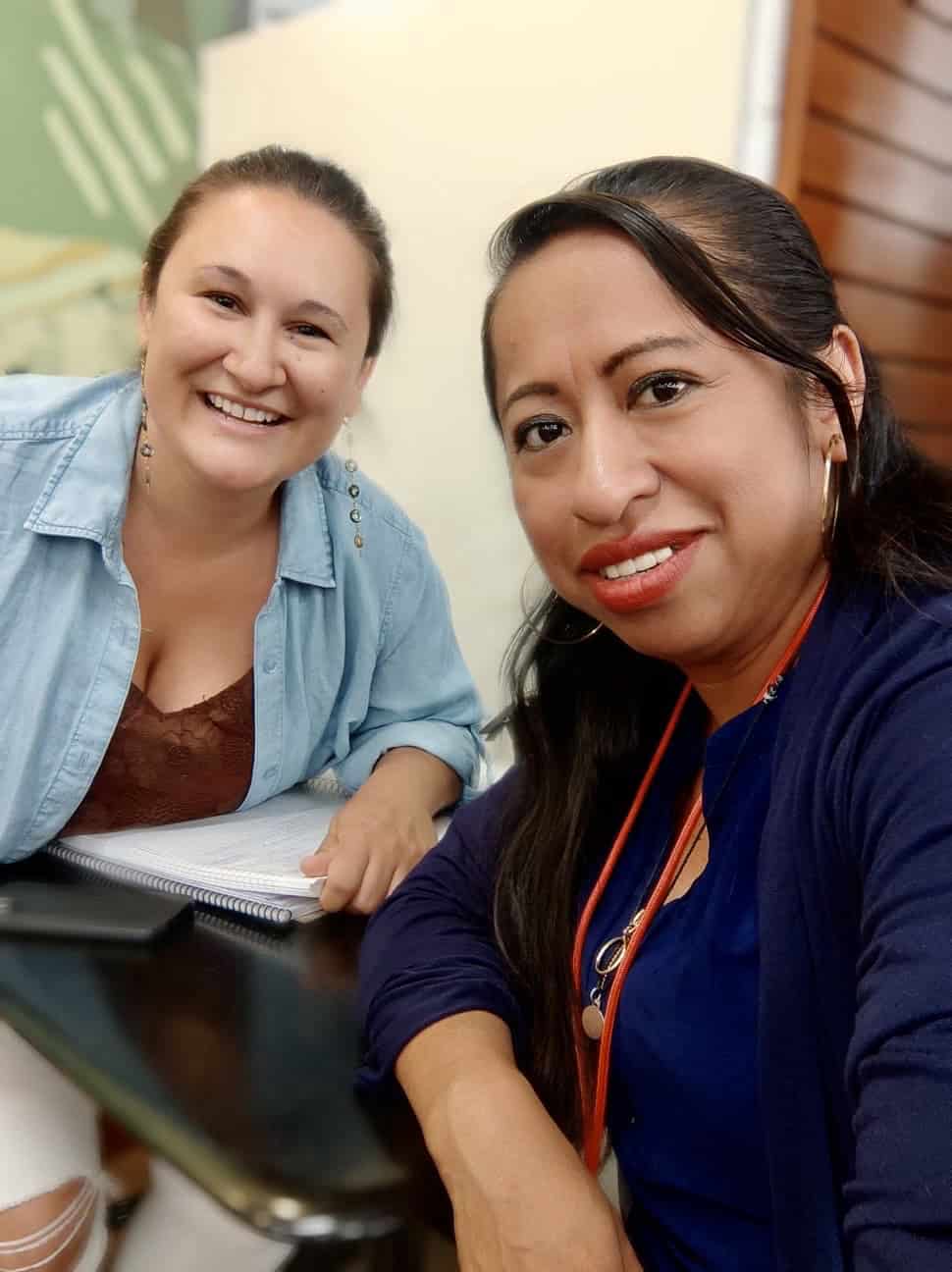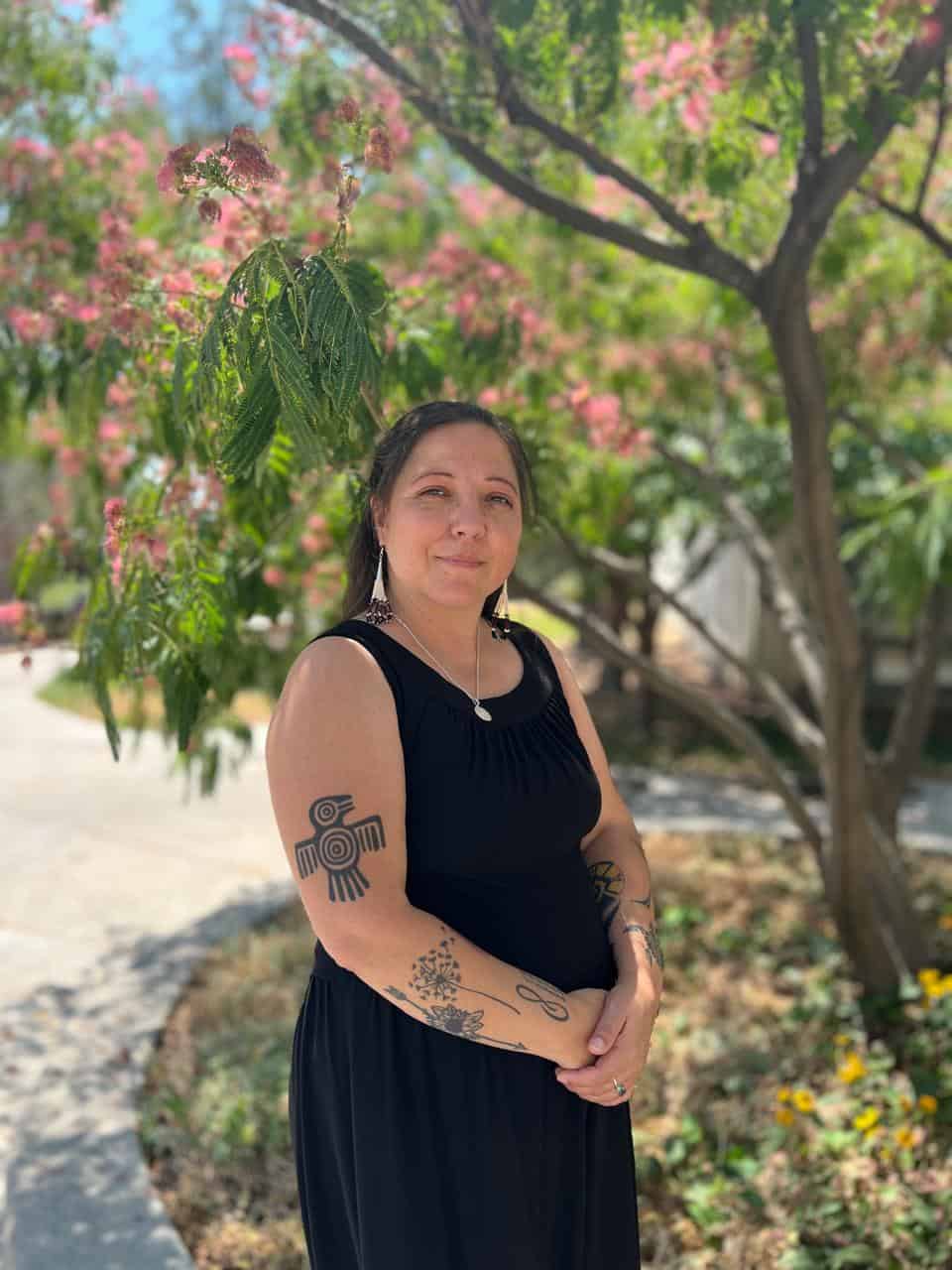Utah Nahuatl Language and Culture Program
Intensive Nahuatl Language Study
About the Program:
Dates: June 23rd - August 1st, 2025 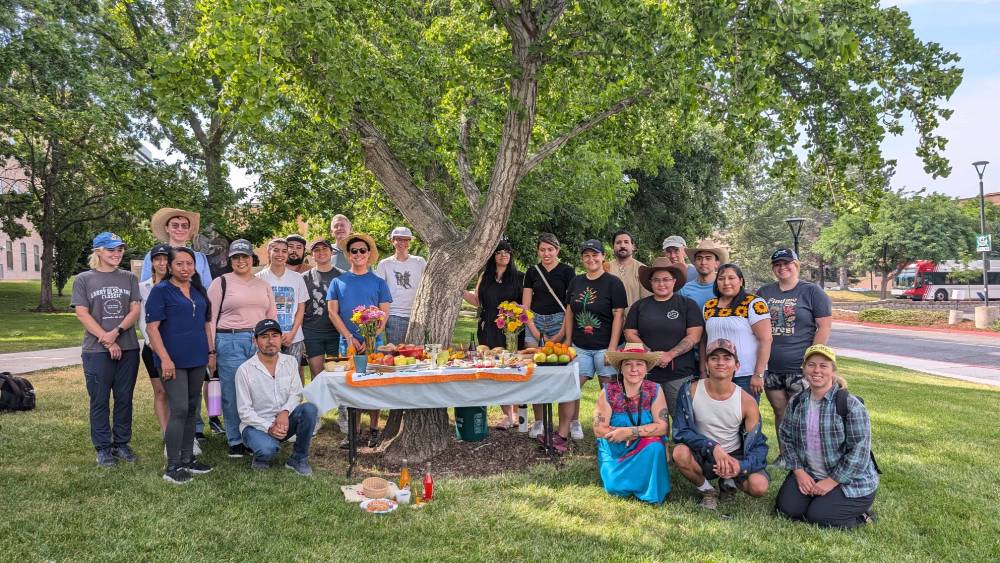
Location: University of Utah Campus
Program Application Due: March 31, 2025
Foreign Language & Area Studies Fellowship (FLAS) Funding Application Due: Friday January 31st, 2025.
Eligibility:The program is open to all undergraduate and graduate students, faculty, community members, and the public at large over the age of 18.
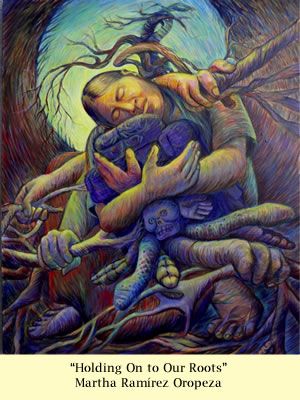 The Center for Latin American Studies at the University of Utah, in partnership with
IDIEZ (the Instituto de Docencia e Investigación Etnológica de Zacatecas, Mexico),
offers a summer intensive language program for Nahuatl, a Uto-Aztecan language spoken
in Mexico. The program has grown to become the most robust Nahuatl program in the
country and annually hosts students and scholars from across the country and abroad.
The Center for Latin American Studies at the University of Utah, in partnership with
IDIEZ (the Instituto de Docencia e Investigación Etnológica de Zacatecas, Mexico),
offers a summer intensive language program for Nahuatl, a Uto-Aztecan language spoken
in Mexico. The program has grown to become the most robust Nahuatl program in the
country and annually hosts students and scholars from across the country and abroad.
Hosted at the University of Utah (UU), this intensive program runs Monday through
Friday for six weeks with a minimum of five hours of instruction Monday through Friday.
The curriculum includes a combination of classroom and small group instruction in
the classical and modern forms of Nahuatl at the beginning, intermediate and advanced
levels (4 Years of Study) from by highly trained native-language speakers.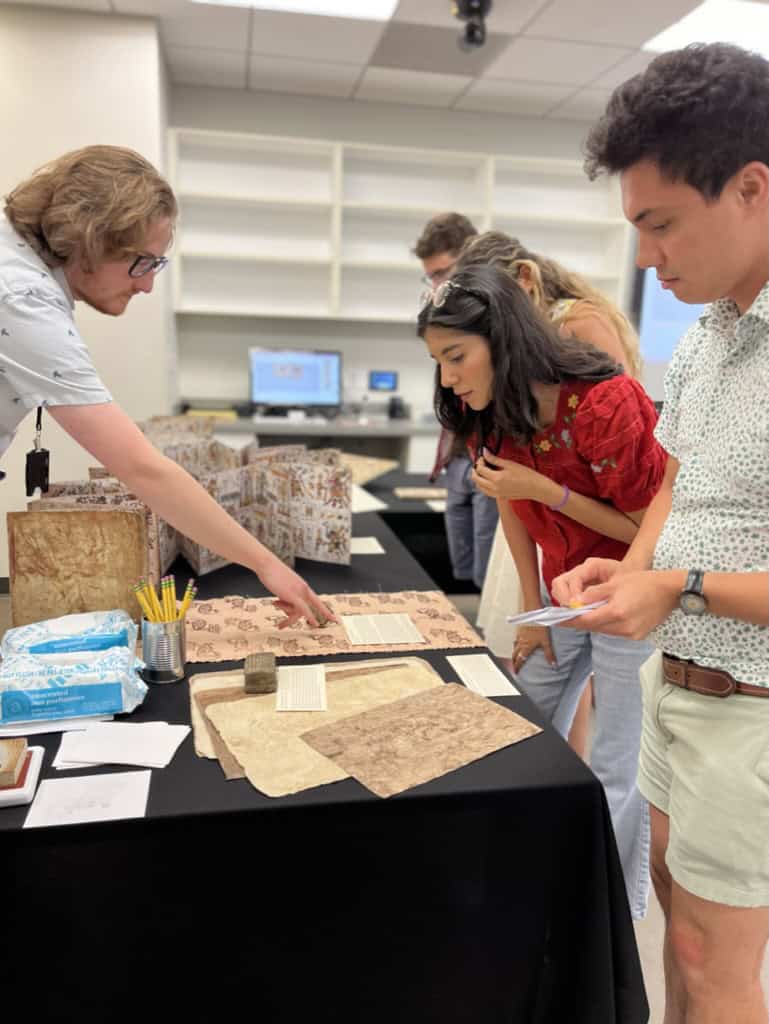 Additionally, students participate in regular tutoring, presentations, and cultural
activities that provide students with a holistic and solid foundation of both Nahuatl
language and culture.
Additionally, students participate in regular tutoring, presentations, and cultural
activities that provide students with a holistic and solid foundation of both Nahuatl
language and culture.
This program builds upon tThe University of Utah has a rich history of Nahuatl studies that includes the English translation and publication of the Florentine Codex by Charles Dibble and Arthur Anderson. In fact, the UU Marriott Library’s collection of facsimiles of Meso-American Codices is among the most important in the United States. As part of the program students will receive a guided tour of these collections from special collections experts.
Summer Nahuatl Program applications received by March 31st deadline will be given preferential enrollment. Applications will be accepted on a rolling basis after the March 31st deadline until all spots are filled. Students are encouraged to apply before March 31st as space may be limited after this date. Students applying for FLAS fellowships should also complete the Summer Nahuatl Program Application as soon as possible to secure preferential enrollment. Please complete the application regardless of whether you have received notice of FLAS or other scholarship funding. Completing the online summer Nahuatl application does not commit the student to attend the program but is crucial in securing a spot. Students can withdraw should their circumstances change or if FLAS/other funding isn’t awarded.
Please explore the information lined below and in the side menu for more detailed information. If you have questions about applications, the curriculum, or on-campus housing, please contact Kari Moore at summernahuatl@utah.edu. For FLAS specific questions please contact our scholarship coordinator, Roxanna Lee at flas@utah.edu.
The course seeks to:
- Develop students’ oral comprehension, speaking, reading, writing as well as their cultural wisdom and sensibility in order to communicate effectively, correctly, and creatively in everyday situations
- Provide students with instruments and experiences that demonstrate the continuity between past and present Nahua culture, through the study of colonial and modern texts and conversation with native speakers
- Penetrate the historical, economic, political, social, and cultural aspects of Nahua civilization
- Prepare students to take university-level humanities courses taught in Nahuatl alongside native speakers
January 31st, 2025 -Foreign Language & Area Studies Fellowship (FLAS) Funding Application Due
For more information, please see our Financial Assistance Page.
March 31st, 2025 - Summer Nahuatl Program Application Due
Summer Nahuatl Program applications received by March 31st deadline will be given preferential enrollment. Applications will be accepted on a rolling basis after the March 31st deadline until all spots are filled. Students are encouraged to apply before March 31st as space may be limited after this date. Students applying for FLAS fellowships should also complete the Summer Nahuatl Program Application as soon as possible to secure preferential enrollment. Please complete the application regardless of whether you have received notice of FLAS or other scholarship funding. Completing the online summer Nahuatl application does not commit the student to attend the program but is crucial in securing a spot. Students can withdraw should their circumstances change or if FLAS/other funding isn’t awarded.
Students who complete this intensive language course will be awarded 6-8 credits (8 credits for beginner and intermediate and 6 credit for advanced), equivalent to two semesters of intensive coursework. These credits are awarded by the University of Utah and students seeking to transfer their credits institution will need to work with their home academic institution to confirm and process the transfer credits.
If you are a past student you can access your previous grades and/or request a transcript by logging into your CIS account using your Unid here. Once you’ve logged in you will be brought to the student homepage. Then select the Academic Records button and you will be brought to a page with a record of your grades and can download an unofficial transcript or request an official transcript.
Tuition: $5,000. (Room and board are not included in the $5,000 tuition.)
Housing on campus:
Housing is available on campus in shared apartments (2-4 bedrooms, and a kitchen). Our goal is to create a language learning community on campus, so students are strongly encouraged to stay on campus. Approximate costs for on-campus housing will be $1,400 - $1,700 for 6 weeks. Meals are not included. (Rates vary depending on the number of bedrooms in the apartment (3-4 bedrooms). The program has a hold on a block of rooms for students and we will help you through the reservation process after application decisions are sent at the beginning of April.
Housing off campus:
While we do highly recommend staying in university housing to facilitate your access to resources and to create a learning community you are not required to stay on campus. Students wishing to stay off campus are responsible for finding their own housing and for coordinating their commute to and from campus.
For more information on housing please visit our housing page.
We make every effort to ensure financial constraints are not an obstacle to participating in the Summer Nahuatl Language program by providing FLAS fellowships and other partial tuition assistance to students.
FLAS Fellowships:
The program offers FLAS fellowships to UU AND non-UU students when possible. FLAS fellowships cover the $5,000 tuition and a provide an additional $2,500 stipend that can be used for housing and other incidentals. Learn more about FLAS here.
Partial tuition assistance:
Additionally some partial tuition assistance is available for students in financial need. If you would like to apply for this financial assistance please contact us directly for more information.
For more information please review our financial assistance page.
"I am a returning summer student because my education in Nahuatl has not only enriched my research and made it more critical, but I have become more and more invested in the revitalization of Indigenous languages and Nahua history and culture. The 2020 Summer Program helped me build connections with Nahua instructors from IDIEZ who have taught me the necessity and politics of Indigenous-led, community-centered language revitalization projects. In personal conversations, I learned about instructors’ academic work and challenges with producing ethical knowledge. In my 1:1 sessions, I learned more about differences in Classical and Modern Nahuatl by discussing The Cantares Mexicanos as interpreted by scholars like Miguel León-Portilla. The Brown Bag talks exposed me to Nahua scholars and other Indigenous researchers such as Lourdes Alberto, whom I developed a connection to and provided me key questions and suggestions for my future work. Inspired by Dr. Alberto and what I learned last summer, I am producing a Qualifying Paper that does literary analysis of Gloria Anzaldúa’s Borderlands from the perspective of the Mexica deities and places invoked in the text. I aim to publish a version of this work and push Chicanx Studies to re-examine its treatment of Mexica culture and its relation to Indigenous people. As an aspiring Chicanx Studies/Latinx Studies professor, my goal is to push scholars and students to think transborder-ly about how discrimination against Indigenous peoples travels. I believe issues around Chicanx identity can potentially be resolved by educating more about Mexican histories of colonialism and Indigenous peoples enduring forms of resistance and survival. I also value my connections with IDIEZ instructors and want to explore how I can use my ethnographic training, educational experience, and Nahuatl knowledge to support language revitalization and preservation of Nahua knowledges."
- Jose Ruben Diaz Vasquez, PhD student from Stanford
"The summer Nahuatl program allowed me to rapidly develop my language skills in a way
that couldn’t be replicated over Zoom. The cultural activities, including the corn-planting ceremony and embroidery classes, made for a memorable hands-on experience, while the daily tutoring sessions provided the flexibility for students to focus on the skills they wanted to practice the most. I particularly enjoyed the older Nahuatl class, where I practiced paleography and began to develop an understanding of how the language has—and has not—changed over the last four centuries."
- Abigail Weinberg, MA student from UCLA
It was an honor to participate in six weeks of intensive Nahuatl classes with John, Abraham, and Sabina. Sabina's expertise was particularly helpful as my interests overlap with her research on topics such as plants, healing, and religious traditions in Mesoamerica. While Sabina taught me about contemporary ceremonies like Tlatlacualiztli (petición de lluvia), in Older Nahuatl with John we translated and discussed documents which included religious elements, both Spanish and Indigenous, from the early colonial period. As a Chicana/Mexican American student, the courses and relationships I developed here gave me a deeper appreciation and understanding of contemporary Indigenous communities in Mexico as well as important topics like migration, language revitalization, education, ancestral knowledge and practices.
- Rebecca Mendoza , PhD student from Harvard
This was my first time attending the University of Utah’s Summer Nahuatl Language and Culture
Program, and I had such an enriching and positive experience that I would very much like to return. As a PhD candidate in history, focusing on religious conversion in central Mexico in the sixteenth and seventeenth centuries, this program was unique in helping me to improve my language skills not only in Older Nahuatl, but also in modern Huastecan Nahuatl. The structure of the course, which involved intensive classes in both forms of the language, encouraged me to reflect on the linguistic relationships between the older and present-day varieties of Nahuatl, and created a fruitful dialogue between the pre-contact and colonial periods, the more recent past, and the present. The course helped me improve my main target skill for historical research – reading, especially of colonial-period documents – but also helped me improve my listening, speaking, and writing skills, all of which are mutually reinforcing. In addition to these two classes, I also greatly benefited from the private tutoring offered by the program, which provided a valuable opportunity not only to review grammar and vocabulary, but also to read texts together and speak in Nahuatl about a variety of topics. I also enjoyed the cultural activity that I chose, embroidery, which provided important lessons not only in an artistic practice itself but also about the broader cultural and social significance of this artform.
Beyond our time studying in formal classes, our schedules were enriched by listening to a variety of lectures, visiting the University Library’s Special Collections to consult the University of Utah’s important collection of Mesoamerican codex facsimiles, participating in a maize planting ceremony, and cooking food together in a culinary class. I was also grateful to have the opportunity to present my own work in progress, and to hear questions and feedback from my colleagues. Beyond studying together and asking one another questions about the language, many of my fellow students also organized social outings, whether locally at the university to have a picnic in the beautiful botanical garden, into the city to get gelato or coffee or to go the aviary in Liberty Park, or further afield to go hiking in the spectacular alpine forests of Big Cottonwood Canyon. Thus, in addition to the formal course of study, I was grateful to have the opportunity to meet and interact with many students from a wide variety of disciplines and backgrounds, whose goals for learning and using the language were diverse but who all came to the course with a respect for and interest in Nahuatl. Overall, I found both the University of Utah and Salt Lake City to be welcoming places for studying and engaging with my colleagues and teachers, and this setting provided an ideal environment to grow as a student of Nahuatl.
To sum up, this holistic language program combines a remarkable diversity, quantity, and quality of both linguistic and cultural activities into just six short weeks, which speaks volumes to the dedication of the course’s teachers, organizers, and students. It was truly an honor to participate this summer, and I hope to return in the future to continue my studies of Nahuatl. If you are considering applying, I encourage you to do so, as the experience will be valuable and worthwhile.
- Chase Smith, PhD Candidate in History at UCLA
This summer, I had the privilege of participating in the University of Utah's Summer Nahuatl Program. The program was expertly taught mostly by native-speaking professors, offering a rich immersion experience without traveling to Mexico. Alongside students of various ages from all over the country, I had the opportunity to dive deeply into the Nahuatl language and gain valuable insights into the culture of Nahuatl speakers.
This program has been immensely rewarding. Although the language that I was studying was the original lingua franca of North America, Nahuatl, the language instructors utilized Spanish to teach the language thereby reinforcing my proficiency with Spanish as well.
Another major strength of the program was its comprehensive approach, simultaneously teaching both Modern and Classical Nahuatl. This dual focus allows me to apply Modern Nahuatl in my community and family to support healing and language revitalization efforts, while the study of Classical Nahuatl introduced me to fascinating academic fields such as paleography and linguistics. Engaging in cultural activities like embroidery allowed me to practice speaking Nahuatl and mirror activities in Nahuatl-speaking communities.
The tutoring sessions were particularly beneficial, offering daily, individualized support that helped solidify the concepts taught in class. The accessibility and support from all professors and program administrators were exceptional, ensuring that any content-related or logistical needs were promptly addressed.
Although the program was intense and the days were long, the experience of being a student again gave me a newfound appreciation for my own students' challenges in learning a new language. This perspective has provided me with fresh ideas for enhancing my instructional approach.
I am eager to participate in the Summer Nahuatl Program again in the future and highly recommend it to anyone interested in learning Nahuatl. This program is an invaluable resource for anyone passionate about language learning and cultural exploration.
- Rudionna Garza, M.Ed. | Current Spanish Language Instructor at the Denver School of Science and Technology

